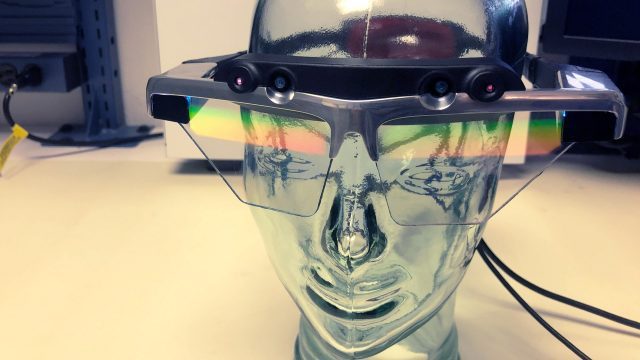DigiLens, a creator of waveguide optics and related manufacturing technology today announced the closure of a $50 million Series C investment, adding UDC Ventures and Samsung Ventures to its list of investors.
Update (May 14th, 2019): DigiLens creates waveguide optics for everything from eyeglass-thin display pipelines for AR headsets and smartglasses to larger displays for automobiles, avionics, retail, and architecture.
Last we heard of DigiLens’ Series C investment was this time last year when existing investor Continental joined the Series which had amounted to $25 million. Today DigiLens says it has closed its Series C round after raising $50 million in exchange for preferred equity, bringing the company’s total venture funding to $85 million by our count.
UDC Ventures and Samsung Ventures newly joined the round which also includes participation by Niantic, Continental AG, Sony Innovation Fund, Diamond Edge Ventures, the venture arm of Mitsubishi Chemical Holdings Corporation, and others, DigiLens says.
With both UDC and Samsung being major players in the display space, their investments could be a strategic play to create synergy between their display technologies and DigiLens’ waveguide technology as AR grows.
The original article about Continental’s participation in the Series C round continues below.
Original Article (May 17th, 2018): Continental, a leading German automotive manufacturing company, is increasing its investment in Silicon Valley-based waveguide company DigiLens, bringing a $25 million Series C financing round to the company.
Continental first invested in DigiLens in 2016 alongside Sony, Panasonic, Nautilus Venture Partners, Foxconn, Dolby, Bold Capital Partners, and Alsop Louie Partners—an investment of $22 million in its Series B. Including the Series C announced today, DigiLens claims a total investment of $60 million.
DigiLens creates waveguide optics for OEMs, providing both eyeglass-thin displays for AR headsets and larger displays for automobiles, avionics, retail and architecture. While Continental’s investment will primary concentrate on the automotive heads-up displays (HUDs), the cash injection could mean further breakthroughs for smaller waveguides like those used in AR headsets.
The company says in a press release that they’ve developed “a high-performance photopolymer material and copy process to manufacture precision diffractive optics by printing (not etching) the nanostructures,” which is positioned as a low-cost technique of creating large format waveguides. DigiLens claims the resultant eyeglass display has higher efficiency and a wider field of view compared to conventional waveguides.


“Based on the waveguide technology, we see a great potential to realize augmented reality head-up displays also for a broad market”, says Thorsten-Alexander Kern, Continental’s Head of HUD Product Development and now member of the DigiLens board of Directors.
In general, waveguides are touted for their relatively small size compared to other styles of HUDs, which tend to use mirrors to direct and magnify images to the eye; waveguides offer a space and weight saving benefit DigiLens and Continental consider fundamental to the next generation of automotive HUDs.
“As a result of strong encouragement after several customer demonstrations, we are excited to intensify our joint efforts and accelerate development. Continental’s support at the highest level is a testament to their enthusiasm and our common values,” said Chris Pickett, CEO of DigiLens. “Engineers from both of our companies are pioneering a disruptive solution.”
With its additional investment, Continental says they now hold close to 18% of DigiLens after the latest round.

